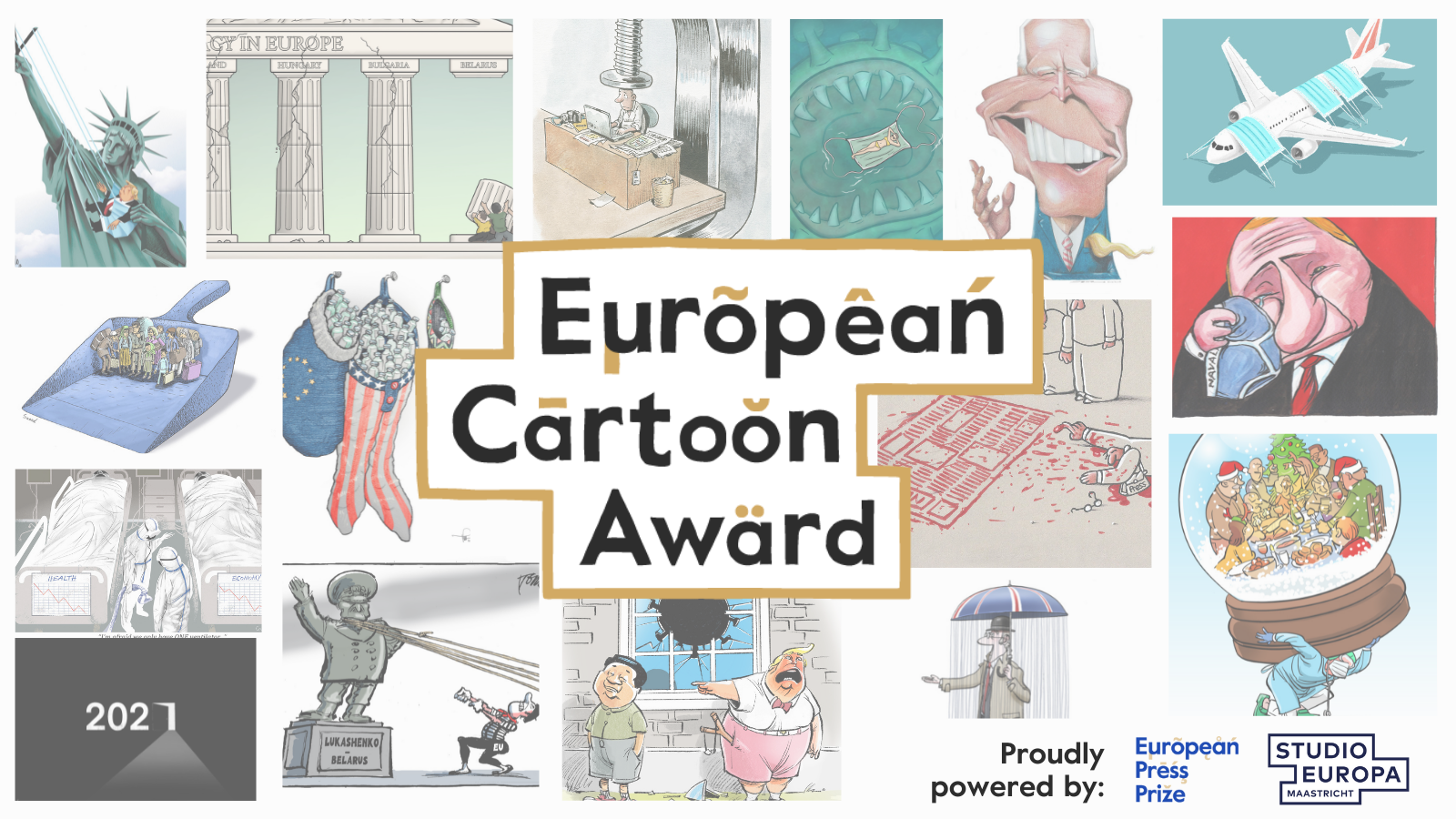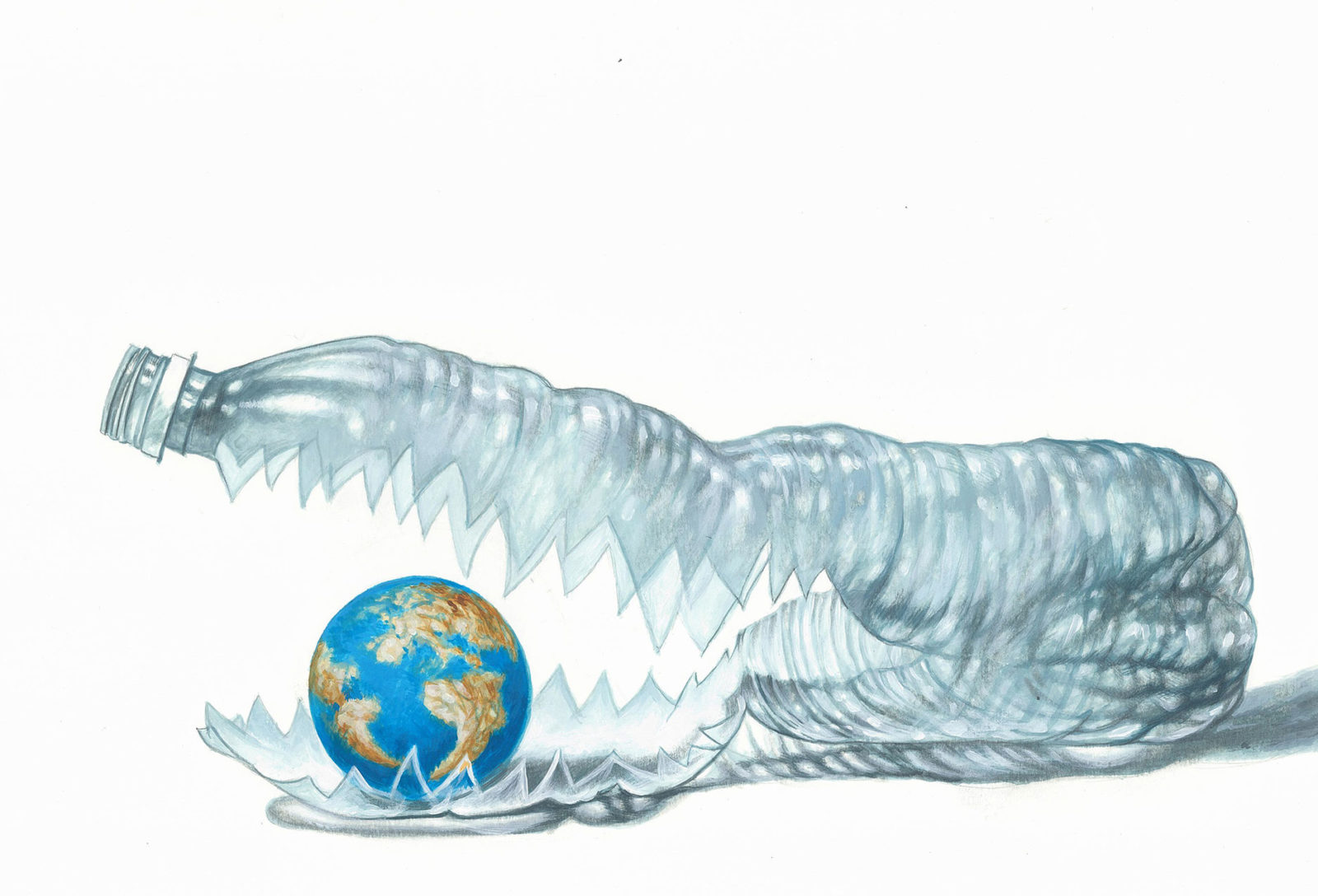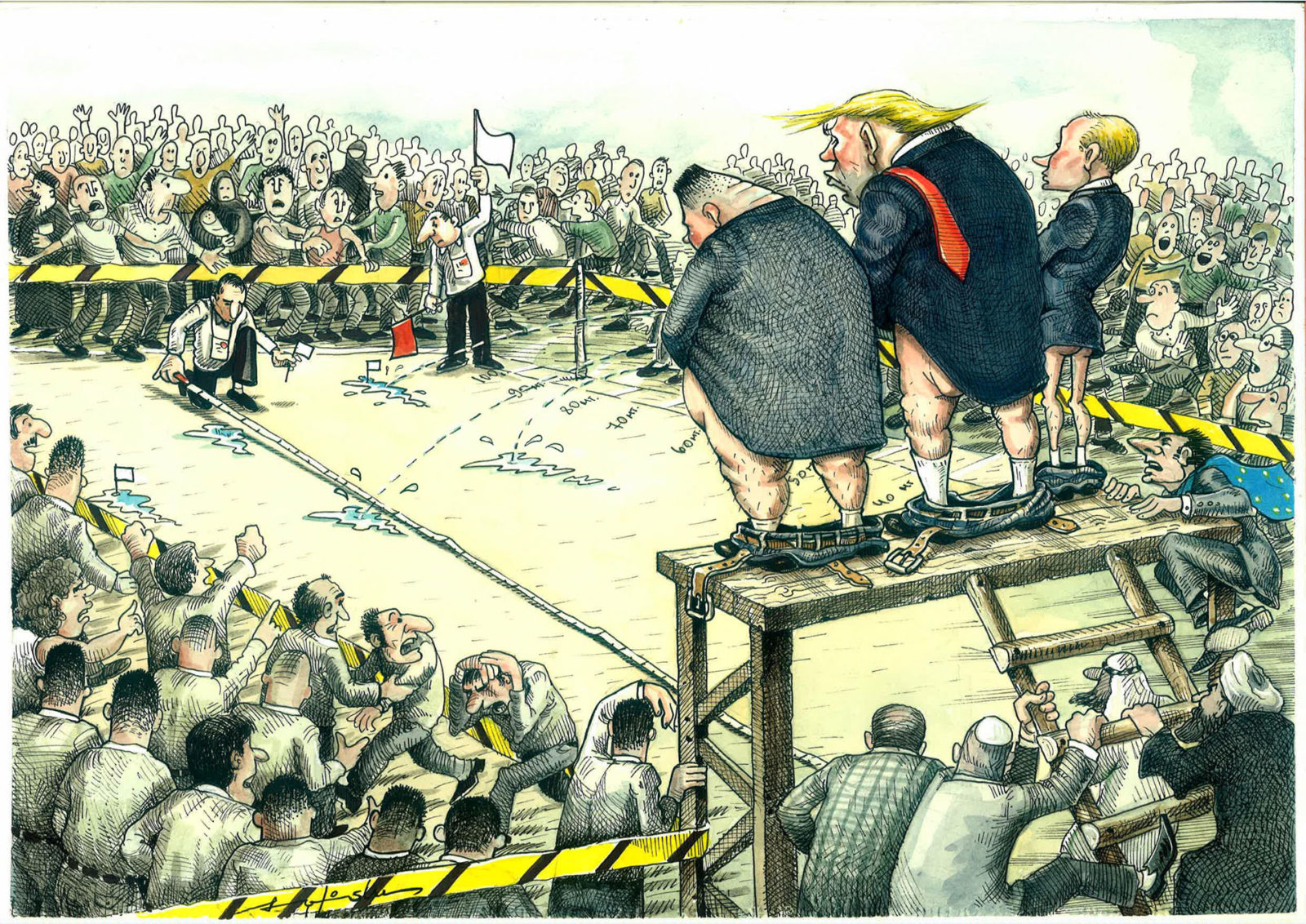The European Cartoon Award 2021 nominees
The European Cartoon Award announces the nominees for its 2021 edition. 16 works were selected by the Panel of judges and the Laureates jury from a total of 287 submissions, sent by cartoonists from 28 countries. These cartoons tell the story of the past year, ranging from the coronavirus pandemic and the USA presidential election, to Brexit, migrations, and the most recent Belarus attack on journalists.
The name of the cartoonist that won the prestigious 10 thousand euros ECA 2021 prize and of the two runners-up will be released in September.
Click here to see the 16 cartoons.

The nominees
From the group of 14 cartoonists who reached the final stage of the ECA, the Panel of judges will identify a winner and two runners-up, chosen for the poignancy and relevancy their work has had on an international level. The nominees are: André Carrilho, Vitor Neves and Vasco Gargalo and Pedro Silva from Portugal; Marco de Angelis from Italy; Niels Bo Bojesen from Denmark; Muse Gumus from Turkey; Osama Hajjaj from Jordan; Tchavdar Nikolov from Bulgaria; Saeed Sadeghi from Iran; Tom Janssen, Hajo de Rejiger and Tjeerd Royaards from the Netherlands; and Konstantinos Tsanakas – DINO, from Greece.
The Jury
The Panel of Judges was composed by: Janet Anderson (Chair), Khalid Albaih, Gian-Paolo Accardo, Paulo Jorge Fernandes, Anne Derenne. The Laureates jury counted five among the previous year’s nominees: Costel Patrascan, Mette Dreyer, Claudio Antonio Gomes, Halit Kurtulmuş, Tomás Serrano.
A word from the organizers
Thomas van Neerbos, director of the European Press Prize
“Cartoonists are an ‘endangered species’: they increasingly face resistance, threats, and sometimes even censorship. Their space is becoming more and more restricted, both in literal ‘airtime’ and in the themes they address. That also applies to cartoonists here in Europe.”
Gonny Willems, director of Studio Europa Maastricht
“In these unprecedented times of polarization, there is more and more a lack of understanding for the perspective of the other and a well-founded critical sound. The power of political cartoons is to offer an opening to the truth of the other with irony, humor and sharpness.”
About the European Cartoon Award
The European Cartoon Award was founded by the European Press Prize and Studio Europa Maastricht in 2019 – the year in which the New York Times decided to stop running editorial cartoons altogether. Both organizations aim to award courage and quality in the field of cartooning, encouraging cartoonists to continue their essential task, crucial for a healthy democratic society – both within and outside Europe.
The Librexpression centre has recently joined the ECA as publishing partner.
Like clean-up fish: a conversation with the ECA cartoonists
While the jury of the European Cartoon Award is busy selecting the winner and runners-up for this year’s edition, we asked some questions to the ECA 2020’s shortlisted cartoonist.
, , Costel Patrascan,
1) How did you become a cartoonist?
Halit: I was actually a painter. I was living my life drawing oil paints, watercolors, still lifes or portraits. One day I saw a poster and my life changed. That poster was the promotional poster of a cartoon competition. I participated in this competition and won an award. That’s how I stepped into the world of cartoons, albeit by chance.
Costel: I started making caricatures in 1989, immediately after the Romanian Revolution, when the communist regime fell. All the people had at that moment an irrepressible feeling of freedom of expression, most Romanians wanted to say something… I took my chance to make my expression public, in this particular graphic way, in newspapers. And I have never stopped since!
2) Why are political cartoons important?
Costel: I believe that the measure of a cartoonist is given by the importance of the topics he approaches, and the political caricature is one of the most important! Why? Because political decisions, especially in my country, have an immediate impact on our lives, and too many times in the wrong way… A cartoonist must be careful and react, with his means, when things do not work properly. I often compare the work of a cartoonist with that of a clean-up fish in an aquarium, that does something useful for its environment.
Hajo: Cartoons won’t overthrow governments, or change the opinions of a radical group or individual. They will, however, give people a handle for their beliefs. I can therefore empower a person or group, or deepen a thought.
Marco: Political cartoons are important because they really are a form of journalistic commentary, they are like an editorial, but using images. Cartoons can be without words (only with a graphic metaphor), or with a caption or a balloon, but their strength is always the conceptual and visual synthesis. There lies their strength, in their ability to make people smile and think at the same time, leaving a mark in the mind and the eyes of the reader.
3) Why do you think it is important to award cartoonists?
Bo: to raise awareness on a profession that is under severe pressure from totalitarian thinking in any shape and form. Moreover, on a personal level, it is obviously a great honor to be presented alongside fellow European Press laureates.
Costel: Cartoonists are a rare species because this profession must meet a number of qualities hard to find in one person: graphic talent, humor, conciseness, being informed, civic courage, and being aware of the status of moralizer a cartoonist has. That’s why there are few cartoonists… Why should cartoonists be awarded? Because civic courage must be appreciated and stimulated. Speaking truth at any cost has become such a rare attitude in the conformist society in which we live today.
“I often compare the work of a cartoonist with that of a clean-up fish in an aquarium, that does something useful for its environment.”
Marco: I think it’s important to award cartoonists because they carry out critical and informative work by helping people to understand the facts and see them in their harsh reality, with the therapeutic help of a smile. In many countries, the work of cartoonists does not offer easy earning opportunities and in many others, they risk their liberty or life. I believe it’s a duty to protect and defend the work and lives of all these authors.

The drama of plastic pollution, by Agim Sulaj
4) What is the most frustrating thing for a cartoonist?
Claudio: I usually say that I am very afraid of self-censorship. Brazil is reliving, with the Jair Bolsonaro government, after the period of the military dictatorship (1964-1985), a climate of terror: we again have a lot of disrespect, intimidation, and disproportionate persecution of journalists (cartoonists) and freedom of the press and expression.
Halit: Cartoons represent freedom, courage, intelligence, tolerance etc. Despite this, many cartoons are censored in many countries, and their cartoonists become open targets. Personally, many of my cartoons were censored. I was threatened many times because of the cartoons I drew. This is quite frustrating. But I did not give up, I continue to draw.
Another frustrating issue is copyright infringement. Our works are often used without our knowledge and permission. After all, cartoonists are also workers and labor has a price. It is very frustrating to have our works stolen.
Hajo: The most frustrating thing for a cartoonist is to be misunderstood by the public. It’s frustrating because you might think it’s the readers’ fault, but it comes down to the fact the cartoon is just not clear in its message.

World politics, by Halit
5) Share one secret tip for young aspiring cartoonists.
Claudio: Practice, practice, and practice drawing, without caring so much about criticism. Thoroughly research the styles of classic and avant-garde painting artists and the most outstanding cartoonists over the centuries.
Bo: Ask questions – your audience will answer them.

